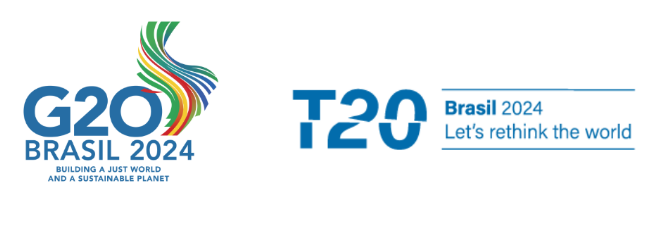Democratizing AI systems as DPGs: Insights from T20 policy brief co-authored by the DPGA

Author: Lea Gimpel, Director of AI and Country Engagement (Visiting Fellow)
Against the backdrop of the G20 DEWG Ministerial Declaration’s emphasis on the role of open-source in AI development and the prominent recognition that DPGs received in the UN Global Digital Compact, the DPGA secretariat is proud to share its T20 policy recommendations on democratizing AI systems as DPGs.
Artificial Intelligence (AI) is shaping the future of economies and societies worldwide, but the benefits remain unevenly distributed, particularly between global minority countries and the global majority. The recently published T20 policy brief “Democratizing AI for the Public Good: Key Concepts and Recommendations” provides recommendations on how the G20 can work towards bridging this gap, ensuring that AI’s transformative potential is accessible to all. The Digital Public Goods Alliance Secretariat co-authored this policy brief with representatives from GIZ FAIR Forward, Open Future, the Mozilla Foundation, the Digital Futures Lab, the University of Pretoria, and IT for Change.
These recommendations are well-aligned with the G20 Ministerial Declaration on Digital Inclusion for All, adopted by the G20 Digital Economy Ministers on September 13, 2024. The declaration emphasises the need for inclusive access to AI technology, particularly for developing countries, and underscored the importance of harnessing open-source technologies and open data to deliver AI benefits at scale. These aspects were also recognized in the recently adopted UN Global Digital Compact (GDC), which underscored the importance of digital public goods, including open AI models, as key drivers of inclusive digital transformation and innovation. The encouragement of developing capacity and partnerships on open AI training data was similarly stressed.
The issue: market concentration in AI disadvantages the global majority
Market concentration and limited access to AI resources create economic, social, and political challenges, including reduced innovation, increased discrimination, lack of accountability, and compromised digital sovereignty. For marginalized geographies, these issues are worsened by exploitative data practices that deepen historically prevailing inequalities. The key challenge is ensuring these communities are continuously included and represented in their cultural, linguistic, and social diversity and can develop AI tools at scale that address their unique needs. Addressing these concerns and reaping AI’s benefits by the global majority are core issues for the G20.
Although it is not a panacea, open-source AI is crucial to making progress in gearing AI development toward the public good for the global majority. Open-source AI can support broad accessibility to AI technologies and grant the freedom to utilise, study, share, and modify underlying models. While debates on definitions for open-source AI continue to unfold, the potential for AI is only expanding, making this policy brief a timely contribution to urging the G20 to take more action toward supporting AI development in the spirit of digital public goods.
Key recommendations from the T20 Policy Brief
- Providing public AI infrastructure and developing a shared strategy for developing public generative AI models
- This includes a call for accessible computational resources for advancing public-interest AI and a strategy for developing public generative AI models, as well as smaller, more task-specific models, which can adhere to the DPG Standard more easily, increasing effectiveness and efficiency.
- Creating, curating, and governing high-value open data sets
- This includes creating high-value open datasets for AI training that benefit societies, the environment, and economic development. This work should complement ongoing efforts on open government data with additional data sources and create new datasets and data spaces that incorporate the DPG Standard and harmonize technical standards across jurisdictions to enable widespread use and impact.
- Developing industry standards for the safe disclosure of model weights
- This includes the development of a multidimensional framework to govern the safe release of foundational AI models, including open release practices, informed by ongoing exploratory legislative initiatives in the US and elsewhere and rooted in AI safety research. It includes appropriate oversight and transparency mechanisms for generative AI, such as outlined in the blueprint for the AI Act’s training data transparency requirement for general-purpose AI developed by Open Future and the Mozilla Foundation.
- Harmonizing AI governance for the public good
- This includes establishing a task force to increase interoperability and harmonize national and international AI policy initiatives and international learning on AI governance, co-designed and co-led with global majority countries. In addition, a global model for multi-stakeholder governance of foundational AI technologies should be tested, including democratic bodies that define public benefit and ensure that foundational AI models are rooted in human rights and promote planetary well-being.
Our T20 policy recommendations offer a roadmap for democratizing AI by advancing AI systems and open data as digital public goods, international cooperation, and multi-stakeholder governance. The DPGA Secretariat highly welcomes South Africa’s commitment to work further to close the AI divide in its upcoming presidency in 2025. The G20 Ministerial Declaration, the Global Digital Compact, and South Africa’s leadership in AI during its forthcoming G20 presidency all provide promising avenues for progress on AI systems as digital public goods and, therefore, more equitable AI ecosystems that positively impact people’s lives.